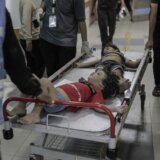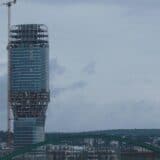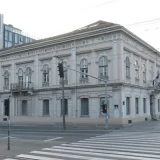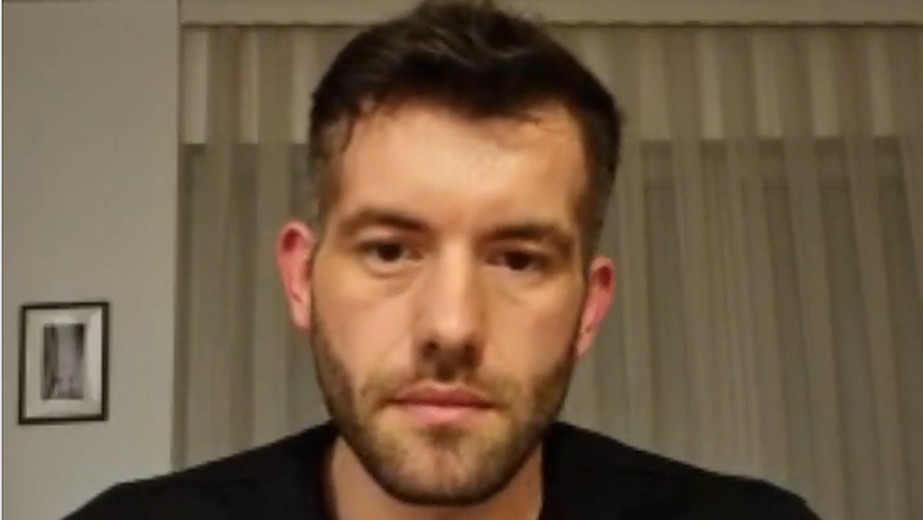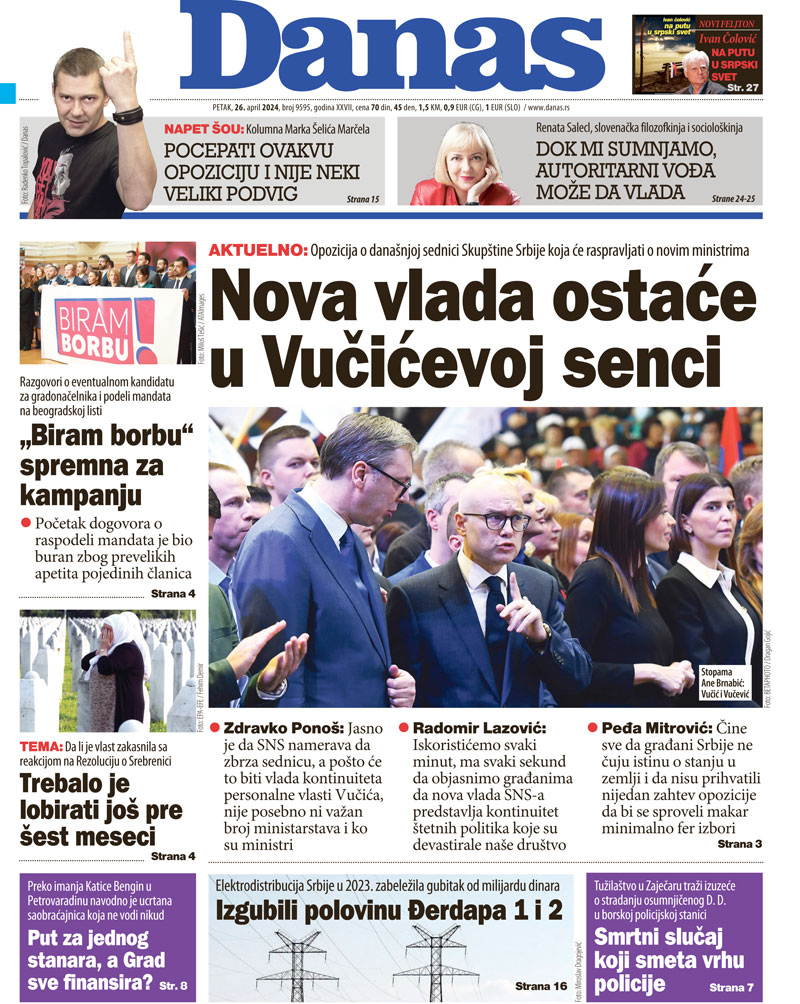
Nadam se da će sadašnje i buduće generacije aktivistkinja i aktivista biti u stanju da oštrije reaguju na pojavu nacionalizma, te da će moći više da utiču na širenje realne slike i informacija, posebno kada se radi o ratnim zločincima.
Nadam se da će biti u stanju da zaustave relativizovanje ili potpuno zanemarivanje događaja i nositelja nasilja iz prošlosti – poručuje Baškim Fazliu (Bashkim Fazliu), aktivista u organizacijama civilnog društva i prevodilac iz Prištine, u intervjuu u sklopu projekta portala Danas „Druga strana Kosova“.
* Pitanja koja su postavili čitaoci Danasa na društvenim mrežama
Kako da bolje povežemo mlade iz Srbije i Kosova?
Mislim da se trenutno mladi mogu jače povezati preko boljeg upoznavanja koje se može dogoditi jedino putem neformalnih programa edukacija ili slično. Nažalost, postojeći obrazovni okviri i politički diskurs koji mlade, kao i sve ostale, i dalje razdvaja i nikako ne daje prostora da se oni upoznaju, rade, povežu i rastu skupa. U ovom trenutku povezanost mladih zavisi od izolovanih pokušaja ograničenog obima. U svakom slučaju, barem postoji neka veza, neki ljudi koji i dalje nešto pokušavaju da rade po pitanju održavanja i uspostavljanja veza i pored postojećeg političkog stanja.
Često se govori da su Albanci na Kosovu u vreme bivše Jugoslavije tretirani kao građani drugog reda. Da li je to tačno i zbog čega?
Da, nažalost, Albanci su tretirani kao neprijateljski element koji se morao odstraniti za vreme obe Jugoslavije, i pre i nakon Drugog svetskog rata. Politička, kulturna i uopšte građanska prava Albanaca su bila ograničena sve do sedamdesetih godina 20.veka. Tokom kratkog perioda od nekoliko godina, sedamdesetih i možda na samom početku osamdesetih godina, Jugoslavija čak postaje emancipatorski projekat i za jugoslavenske Albance. I pored tog perioda, tokom postojanja Jugoslavije je stalno hranjen negativni pristup prema Albancima. Bilo je strašno puno funkcionera, pisaca, kulturnjaka, sveštenika, novinara i ostalih koji su imali uticaja na javni život, koji su se stalno trudili da dehumanizuju Albance u Jugoslaviji, da o njima stvore sliku neprijatelja, ljudi koji ne mogu i nadasve ne smeju biti prihvaćeni kao ravnopravni politički faktor u zajedničkoj državi. Razlog tome je konstantni šovinizam koji je dolazio iz Srbije i pretenzija da se stvori čvrsta kontrola nad teritorijom oko koje se i danas spori. Srpski nacionalisti nikada nisu mogli odustati od megalomanskog projekta etničke države Srba i prihvatiti multikulturalni državni projekt SFR Jugoslavije prema izvornim načelima. Odnos nacionalista iz Srbije prema Albacima, a kasnije i drugima, je na kraju nažalost, ukidanjem autonomije Kosova, i uništio taj načelno plemeniti projekat socijalističke Jugoslavije.
Kakva je mogućnost za zaposlenje na Kosovu?
Javna uprava i javna poduzeća su i dalje najveći poslodavci u državi. Do posla u javnoj upravi se dolazi preko stranačkih linija ili drugih veza i to je sektor preko kojeg se hrani klijentilistička baza političkih stranaka jer su i plate pristojnije za balkanske uslove. Ako niste stranački militant, onda vam preostaje slabo plaćeni privatni sektor u kojem se retko poštuju prava radnika i radni propisi, uključujući one bezbednosne, pa nekako preživljavate iako nikada ne rastete, učite nešto novo ili dobijate veća primanja. Inače su zbog nepoštovanja propisa i neadekvatne opreme povrede i smrtni slučajevi na poslu, posebno u građevini, uznemirujuće brojni. Takav odnos privatnog sektora prema zaposlenima poslednjih godina tera veliki broj kvalifikovanih radnika na rad u Evropsku uniju, posebno Nemačku.
* Pitanja koja su postavili novinari Danasa
Šta bi, prema vašem mišljenju, trebalo najpre i prioritetno učiniti kako bi se odnosi Srbije i Kosova normalizovali?
Rešiti političke probleme. Prihvatiti činjenice i suočiti se sa prošlošću. Edukovati građane, posebno mlade, o potrebi i koristima uspostavljanja odnosa sa susedima.
Kako ocenjujete proces normalizacije koji trenutno vode vlasti u Prištini i Beogradu?
To je politički proces koji konstantno stvara umesto što umanjuje tenzije. S druge strane, ako se tokom tog procesa krše načela građanskih i multietničkih društava i ide ka tome da se ljudi razgraniče po etničkim linijama, onda će to biti poruka da suživot između Srba i Albanaca nije moguć. Na taj način će pobediti ratni huškači i kriminalizovane političke strukture u obe zemlje i to je jako loše za budućnost regiona.
Da li je moguće da proces normalizacije odnosa Kosova i Srbije okončaju političke elite koje su bile aktivne tokom sukoba devedesetih godina?
Ja sam jako skeptičan da se to može dogoditi. Ako će se postići bilo kakav sporazum između Srbije i Kosova, ja mislim da će to biti proces koji će se u budućnosti morati opet pregledati i prepraviti. Strukture koje su dovele do sukoba i vodile sukobe, te bile nositeljice nasilje i svega najgoreg što se desilo, ne bi mogle primeniti bilo kakav kvalitetan i iskren proces pomirenja i saradnje.
Koja su vaša prva sećanja na sukob na Kosovu?
Mislim da se najpre sećam trenutaka iz 1989. godine kada su bili protesti Albanaca protiv uvođenja vojne uprave na Kosovu i kada se miris suzavca koji je bacala policija osećao i u naselju gde smo tada moja porodica i ja živeli. Od tada do danas je taj subok obeležio moj i sve naše živote.
* Pitanja koja je postavio Luka Božović iz Helsinškog odbora
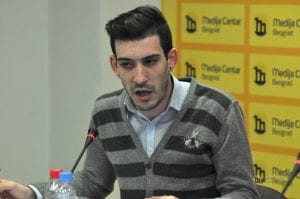
Kako ti danas deluje aktivistička scena na Kosovu? Da li je hrabra kao ona u Srbiji koja se suprotstavlja nacionalizmu, rehabilitaciji ratnih zločinaca i politikama koje su za sobom ostavile hiljade žrtava?
Aktivistička scena Kosova je uticajnija nego ranije. Postoje teme koje su nedavno bile tabu a o kojima se sada hrabro govori, i smatram da je to u dobroj meri rezultat delovanja aktivističke scene. Sve više ljudi podržava pokrete koji štite i promovišu ljudsko dostojanstvo i sve više njih se odluči javno govoriti o trenutnom stanju i načinu na koji je ono deo nasleđa iz prošlosti. Nažalost, aktivistička scena u obe zemlje ne predstavlja neku kritičnu masu koja je u stanju da promeni postojeći politički diskurs, ali je ugodno svedočiti tome da ta scena raste i da ljudi postaju svesniji svoje građanske uloge. Nadam se da će sadašnje i buduće generacije aktivistkinja i aktivista biti u stanju da oštrije reaguju na pojavu nacionalizma i moći više da utiču na širenje realne slike i informacija, posebno kada se radi o ratnim zločincima. Nadam se da će biti u stanju da zaustave relativizovanje ili potpuno zanemarivanje događaja i nositelja nasilja iz prošlosti.
Gotovo jednako dugo smo u aktivističkim vodama, sarađujemo sa mladima u celoj regiji, putujemo i družimo se. Nailazili smo godinama na ovakve ili onakve izazove, borili se sa vetrenjačama i pobeđivali. Da li misliš da je saradnja koja je, rekao bih, sve bolja, dublja i rasprostranjenija posledica političkih odnosa (pregovora lidera itd.) ili se ona dešava uprkos političkim okolnostima?
Ono se svakako dešava uprkos političkim okolnostima. Na svu sreću sve vreme je bilo pokreta, ljudi, aktivista koji su dopirali do ljudi „s druge strane“ i održavali ili čak jačali odnose. Političke okolnosti još uvek nisu takve da se podržava nesmetana razmena i saradnja, dapače, jako često smo svedocima toga da se kulturna razmena ograničava ili se na nju vrši pritisak od strane ekstremista. Moram da primetim da se taj pritisak na pokušaje kulturne razmene na Kosovu ne dešava u onoj meri u kojoj se to dešava u Srbiji, ali isto tako mislim da je to zbog zakona velikih brojeva.
Nas dvojica se znamo godinama. Kada se sledeći put vidimo i gde pijemo kafu?
Krajem marta u Beogradu na Intercultural Icebreakersima.
* Questions asked by Luka Bozovic, the International Helsinki Federation for Human Rights
What do you think about today’s activist scene in Kosovo? Is it brave like this one in Serbia which stands against the nationalism, the rehabilitation of the war criminals and policies which resulted in thousands of victims?
The activist scene in Kosovo is more influential than before. There are subjects which have been taboo until recently, but which are now bravely talked about and I think that it is to a great extent the result of the actions of the activist scene. The increasing number of people support the movements which protect and promote the human dignity and growing number of them dare to speak in the public about the current state of affairs and the way in which it is the part of the legacy of the past. Unfortunately, the activist scene in both countries is not some kind of the critical mass which is capable of changing the existing political discourse, but to be witness to the growth of that scene and to the increasing awareness among people of their civic role is pleasant. I hope that the current and future generations of the activists will be able to respond more severely to the nationalism and make bigger contribution to spreading the real image and information, especially with regard to the war criminals, and stop the relativization or complete disregard of the events and those responsible for the violence from the past.
We are in the waters of activism for almost equal period of time, we cooperate with the young in the whole region, we travel and make friendships. We have faced various challenges for years, we have „tilted at windmills“ and won. Do you think that the cooperation which is, in my opinion, increasingly better, closer and wider the result of the political relations (the negotiations of the leaders, etc.) or it has been maintained despite political circumstances?
It has been definitely maintained despite political circumstances. Fortunately, there were movements, people, activists whose influence extended to people „on the other side“ and who maintained or even strengthened the relations. The political circumstances haven’t still reached a point where the smooth exchange and cooperation would be encouraged – on the contrary, we are very often witness to the cultural exchange being limited and being under pressure from the extremists. I must notice that the attempts at the cultural exchange in Kosovo are not under the pressure to the extent in which they are under the pressure in Serbia, but I also think it is the result of high figures.
We know each other for years. When will we meet again and where will we have a coffee?
At the end of March in the Intercultural Icebreakers in Belgrade.
Questions posted by Danas social networks followers:
How can we establish stronger links between young people from Kosovo and those from Serbia?
I think that young people can currently establish stronger links between each other through getting to know each other better and the only way to make this happen is the informal educational programs and similar things. Unfortunately, the existing educational frameworks and political discourse still create division between young people as well as everybody else and they do not offer any room for their getting to know each other and their working, connecting and growing together. The connection between young people in this moment depends on the isolated attempts with limited range. In any case, there are at least some connection and some people who still try to do something in order to maintain and establish the links in spite of the existing political situation.
It is often said that Albanians in Kosovo were treated as second-class citizens during the era of the former Yugoslavia? Is it true and why?
Yes, unfortunately, Albanians were treated as an hostile element which had to be destroyed during the era of both Yugoslavias and before and after the Second World War. Albanians’ political, cultural and in general, civic rights were infringed until the 1970s. During the short period of several years in the 1970s and maybe in the early 1980s Yugoslavia even became an emancipating project for Yugoslavia’s Albanians. In spite of that period, the negative attitude towards Albanians was constantly nourished. There were numerous high-ranking officials, writers, culturologists, priests, journalists and others who influenced the public life and who constantly made efforts to dehumanize Albanians in Yugoslavia, to present the image of them as the enemies, as people who cannot and, above all, must not be accepted as an equal political factor in the common state. The reason for this was the constant chauvinism that came from Serbia and the pretensions to the establishment of the strict control over the territories which are still disputed today. Serbian nationalists have never been able to abondon the megalomaniacal Serbian ethnic state project and accept the multicultural state project of the SFR Yugoslavia in accordance with its original principles. Unfortunately, Serbian nationalists’ treatment of Albanians and later of others eventually destroyed this fundamentally generous project of the socialist Yugoslavia by the abolition of Kosovo autonomy.
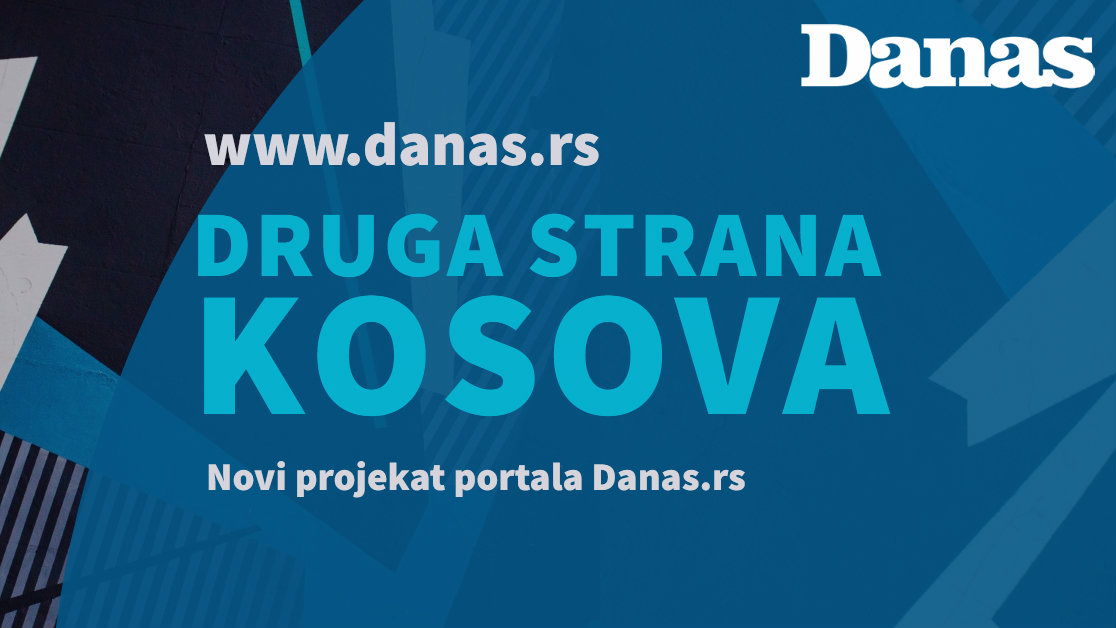
What is the possibility of finding job in Kosovo?
Public service and state-owned enterprises are still major employers in the country. The employment in the public service is obtained by party ranks or other connections and it is the sector through which the customer base of political parties is fed because the wages are decent bearing in mind the conditions in the Balkans states. If you are not a party militant, then you have no option but to accept low-paid jobs in the private sector where the labour rights are seldom respected and labour laws, including health and safety regulations, are rarely obeyed, and then you somehow make ends meet but you never grow, learn something new or earn higher incomes. Due to the disobedience of the regulations and inadequate equipment injuries and deaths at work, especially on the building sites, are disturbingly numerous. Such treatment of the employees in the private sector has forced in recent years many qualified workers to go to work in the European Union, especially in Germany.
* Questions asked by Danas journalists:
What, in your opinion, should be prioritized first and foremost in order to normalize relations between Serbia and Kosovo?
To solve the political problems. To accept the facts and face the past. To educate citizens, especially young people, about the necessity and benefits of the establishment of the relations with the neighbours.
What do you think about the process of normalization that is currently being led by the authorities in Pristina and Belgrade?
It is a political process that constantly creates tensions instead of reducing them. On the other hand, if during that process the principles of civic and multiethnic societies are violated and the goal is to establish borders between people along the ethnic lines, then it will send the message that the coexistence of Serbs and Albanians is not possible. The warmongers and the criminalized political structures will win in both countries in this way and it is very bad for the future of the region.
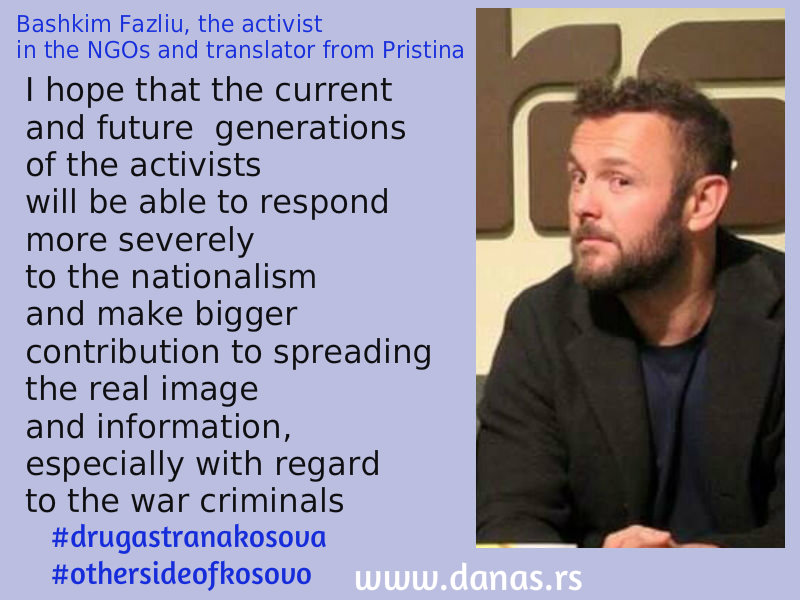
Is it possible that the normalization of relations between Kosovo and Serbia might be achieved by the political elites that were active during the 1990s conflicts?
I am very sceptical about the possibility that this mght happen. If any agreement between Serbia and Kosovo is to be reached, I think that this will be the process which will have to be reviewed and changed again in the future. The structures which led to the conflicts and which led the conflicts and were responsible for all worst things that happened, wouldn’t be able to implement any qualitative and genuine process of the reconciliation and cooperation.
What are your first memories of the conflict in Kosovo?
I think that the first thing I remember is the moment from 1989 when Albanians demonstrated against the introduction of the military administration in Kosovo and when the smell of the tear gas fired by the police colud be sensed in the suburb where my family and I lived at that time. That conflict has marked my life and the life of all of us since that day till today.
Pratite nas na našoj Facebook i Instagram stranici, ali i na Twitter nalogu. Pretplatite se na PDF izdanje lista Danas.

